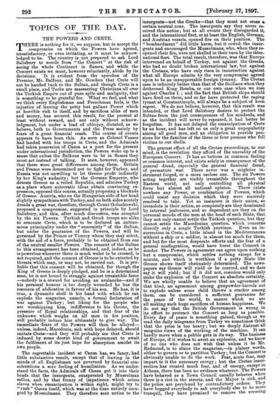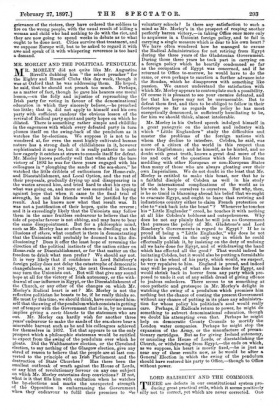TOPICS OF THE DAY.
THE POWERS AND CRETE. THERE is nothing for it, we suppose, but to accept the compromise on which the Powers have agreed, unsatisfactory, or even irritating, as it must be acknow- ledged to be. The country is not prepared to ask Lord Salisbury to secede from "the Concert" at the risk of seeing the whole Continent in flames, and while the Concert exists we must, however reluctantly, abide by its decisions. It is evident from the speeches of the Premier, Mr. Balfour, and Mr. Goschen that Crete will not be handed back to the Sultan, and though Crete is a small place, and Turks are massacring Christians all over the Turkish Empire out of pure spite and malignity, that is something to be grateful for. What we feel, and what we think every Englishman and Frenchman feels, is the injustice of leaving the petty but gallant Power which at horrible risk to itself, and by sacrifices alike of men and money, has secured this result, for the present at least without reward, and not only without acknow- ledgment, but under a load of obloquy, dictated, as we believe, both to Governments and the Press mainly by fears of a great financial crash. The course of events appears to have been this. As soon as Colonel Vassos had landed with his troops in Crete, and the Admirals had taken possession of Canes, as a port for the present under international jurisdiction, the Powers woke up to a sense that unless the Balkans were to be in flames they must act instead of talking. It soon, however, appeared that there were great differences among them. Britain and France were determined not to fight for Turkey, and Russia was not unwilling to let Greece profit indirectly by her Sing's audacity ; but the German Emperor, who detests Greece as a veiled Republic, and admires Turkey as a place where autocratic ideas obtain convincing ex- pression, opposed this course, actually proposing a blockade of Greece. Austria, who on the Hungarian side of her head slightly sympathises with Turkey, and on both sides acutely dreads a great war, therefore, through Count Goluchowski, proposed a compromise, suggested in principle by Lord Salisbury, and this, after much discussion, was accepted by the six Powers. Turkish and Greek troops are alike to evacuate Crete, which is to be declared an autono- mous principality under the " suzerainty " of the Sultan, but under the guarantee of the Powers, and will be governed by the Prince or Viceroy whom they may select, with the aid of a force, probably to be obtained from one of the neutral smaller Powers. The consent of the Sultan to this arrangement has been obtained, and, indeed, as he is powerless wherever there is much water to be crossed, is not required, and the consent of Greece is to be extorted by threats which may, or may not, be carried out. It is pro- bable that this consent will be obtained, for though the King of Greece is deeply pledged, and he is a determined man, he is not bound to struggle against irresistible force —nobody is a coward for avoiding an avalanche—and if his personal honour is too deeply wounded he has the resource of abdication in favour of his son. He has, it is true, a dynamite shell in his hand with which be can explode the magazine, namely, a formal declaration of war against Turkey ; but liking for the people who are worshipping him, indifference to his throne, the pressure of Royal relationships, and that fear of the unknown which weighs on all men in his position, will probably induce him ultimately to give way. The immediate fears of the Powers will then be allayed— unless, indeed, Macedonia, sick with hope delayed, should imitate Crete—and they will probably see that Crete is induced by some decent kind of government to await the fulfilment of its just hope for absorption amidst its own people.
The regrettable incident at Canea has, we fancy, had little substantive result, except that of leaving in the minds of all Englishmen not governed by financial con- siderations a sore feeling of humiliation. As we under- stand the facts, the Admirals off Canea got it into their heads that the insurgents, exasperated by Mussulman sallies, and by that frenzy of impatience which seizes slaves when emancipation is within sight, might try to "rush" Canes itself, which was at the time entirely occu- pied by Mussulmans. They therefore sent notice to the insurgents—not the Greeks—that they must not cross a certain neutral zone. The insurgents say they never re- ceived this notice ; but at all events they disregarded it, and the international fleet, or at least the English, German, and Austrian vessels, opened fire on their position. The " bombardment" did little harm, but it cowed the insur- gents and encouraged the Mussulmans, who, when they re- opened their fire, were not shelled in their turn by the inter- national fleet. The total result, therefore, was that Europe intervened on behalf of Turkey, not against the Greeks, who had no doubt broken international law, but against the Cretans, who have only risen in insurrection against what all Europe admits by the very compromise agreed upon to be an insupportable foreign tyranny. The Cretan case is infinitely better than that of the Sicilians when they dethroned King Bomba, or our own case when we rose against Charles I. ; and the fact that British ships should have fired on them, and so far have protected the raging tyrant at Constantinople, will always be a subject of keen regret. We do not believe, however, that this result was intended, or that Lord Salisbury desires to protect the Sultan from the just consequences of his misdeeds, and as the incident will never be repeated, it had better be forgotten. It has not delayed the emancipation of Crete by an hour, and has left on us only a great unpopularity among all good men, and an obligation to provide pen- sions for the families of the three or four persons who fell' victims to our shells.
The gravest effect of all the Cretan proceedings, to our mind, is the revelation they afford of the unreality of the European Concert. It has no bottom in common feeling or common interest, and exists solely in consequence of the general dread, especially the general financial dread, of premature war. There never was a mightier in- strument forged, or a more useless one. The six Powers acting together are visibly irresistible throughout the Eastern world, not only controlling all physical' force but almost all national opinion. There exists nowhere any Power, or combination of Powers, which could resist any decision which they were sincerely resolved to take. Yet so insincere is their union, so irresolute is their action, so completely are they dominated by internal jealousies, and so dependent are they on the personal moods of the men at the head of each State, that they not only cannot settle the Turkish question, but they cannot settle the Macedonian question, which concerns directly only a single Turkish province. Even an in- surrection in Crete, a little island in the Mediterranean without a ship or a soldier, is almost too much for them, and but for the most desperate efforts and the fear of a general conflagration, would have burst the Concert in sunder. The Powers in agreement can agree upon nothing but a compromise, which settles nothing except for a minute, and which is worthless if a petty State like Greece shows itself obstinately determined. The news- papers say Greece will yield or be coerced, and we dare say it will yield; but if it did not, coercion would only make the explosion of the Concert an absolute certainty. We are wholly unable to believe that an agreement of that kind, an agreement among gunpowder-barrels not to explode unless some child throws a cracker among them, can be considered a sufficient guarantee for the peace of the world, to ensure which we are all making such huge sacrifices of human happiness. We do not say that the British Government is wrong in its effort to protract the Concert as long as possible. Every day of peace is something gained, though as we read the daily telegrams from Turkey we sometimes think that the price is too heavy ; but we deeply distrust all sanguine views of the working of the machine. It can hardly move when a pebble gets in its way. The business of Europe, if it wishes to avert an explosion, and we know of no one who does not wish that unless it be Mr. Redmond, is to sluice the magazine,—in plainer words, either to govern or to partition Turkey ; but the Concert is obviously unable to do the work. Fear, acute fear, may impart to it the necessary energy ; but the Cretan insur- rection has created much fear, and of energy, except in Athens, there has been no evidence whatever. The Powers have behaved as a Town Council usually behaves when there is a riot in the streets, and the Mayor is sick, and the police are perplexed by contradictory orders. They have begged everybody to ask everybody else to be more tranquil, they have promised to remove the pressing grievance of the rioters, they have ordered the soldiers to fire on the wrong people, with the usual result of killing a woman and child who had nothing to do with the riot, and they are now going to spend weeks in debate as to what ought to be done next. Cities survive that treatment, and we suppose Europe will, but to be asked to regard it with awe and speak of it with whispering reverence is too hard a demand.



































 Previous page
Previous page